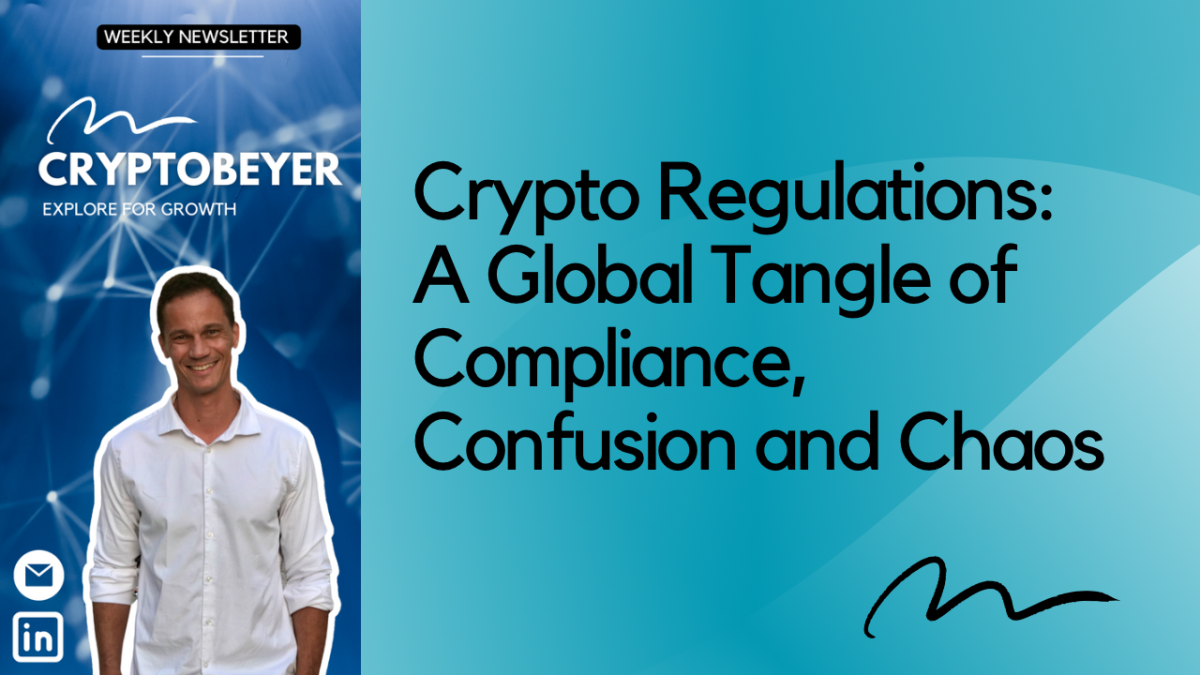Regulatory scrutiny in the crypto space has intensified globally. Exchanges and wallets are compelled to adhere to stringent Know Your Customer (KYC) protocols. Governments aim to gain better oversight into digital asset transactions, while crypto investors are trying to navigate the regulatory swamp. Crypto regulation is both promising and a complete mess. Let’s dig into it.
‘Regulation is fast now,’ said Sukesh Kumar Tedla, founder of Kryptos when I interviewed him. The enforcement of KYC regulations has resulted in a monumental shift for crypto exchanges and wallets. These entities are now (or very soon) obligated to report all transactions to government bodies, signaling a seismic change in the once-opaque sector. Such measures aim to mitigate illicit activities while bringing transparency and accountability to the expanding crypto market.
Unfortunately, the developments of crypto regulation have had difficulty understanding the fast-paced environment of the crypto space, leading to confusion for crypto companies as to what is legal and how to comply. Imagine inventing something new and people like it. People use your services, but later, you might find yourself in a legal battle with regulatory bodies because they do not understand the product. The developments in the crypto space are fast and complex to understand, leaving customers and investors confused. How do you report an airdrop of a digital asset? Actually, you do not have to. But how do you comply with regulation when using decentralized financial systems such as AAVE, MakerDao, or Compound? Sushi Swap may be easy to use, but understanding how to report trades is a headache. Try calling your governing tax agency and ask them how to report staking on Compound.
The founder of Kryptos said that he used to create Excel documents when he reported his trades to the Swedish Tax Agency. That’s when he got the idea to start the company Kryptoskatt, which is now rebranded as Kryptos.io. Basically, Kryptos simplifies the process of crypto finance. In short, their services include connecting to your crypto wallet or exchange, and in a simple process, your taxes are calculated for you. I tried it and found it smooth.
Notably, Sweden stands as an exemplar of the complexities surrounding crypto taxation and compliance. Despite an estimated 300,000 individuals actively engaging in crypto trading within the country, a mere 2,000 individuals have reported their crypto transactions to the tax regulation body. This staggering discrepancy raises profound concerns about tax evasion and regulatory oversight within the Swedish crypto ecosystem.
Authorities are intensifying efforts to bridge this divide by implementing stricter enforcement measures. Kryptos is enjoying an increase in customers using their services. ‘We now have soon 10,000 customers and our services support 3,000 DeFi protocols,’ said Sukesh Kumar Tedla proudly.
"It was great to interview him from his residence in India, but the company started from my hometown, Gothenburg, Sweden. ‘We now operate in over 20 countries and work with the biggest names in the space. Binance, for example...’ ‘Congratulations,’ I said and looked at his laid-back t-shirt. I wore a classic white shirt.
As the crypto industry continues to mature, governments worldwide are grappling with the challenge of balancing innovation with regulatory control. I asked him what he thought about The Markets in Crypto-Assets Regulation (MiCA) proposed by the European Union that aims to introduce stricter rules by 2024. ‘It has not had any impact on the business so far…’ I got the feeling that he thought MiCA was pretty good for the European crypto space. I added that the US is envious of the great work of the European Union. We chatted about the crypto mess in the US and shared a laugh.
As the MiCA regulation seeks to establish a comprehensive framework within the EU for crypto-assets, it categorizes them into e-money tokens, asset-referenced tokens, and other crypto-assets. Whatever that means for the average investor…
In general, MiCA imposes obligations on issuers and service providers to ensure asset security and protect consumers, requiring authorization from national regulators to operate in the EU. These regulations could potentially enhance safety in crypto investments. Great!
However, banks might remain hesitant to offer crypto-related services until the sector becomes more secure and regulated. In Sweden, no banks offer crypto-related services and generally hinder crypto purchases. Companies in Sweden who get paid in cryptocurrencies are forced to use banks abroad. No, Sweden does not love crypto, but Europe is taking a liking.
Industry experts emphasize the need for a nuanced approach to regulation that safeguards against illicit activities without stifling innovation. Striking this delicate balance remains a pressing concern as governments navigate the complex terrain of digital assets. Because Europe sees the potential of blockchain tech and wants to foster innovation.
In Sweden and beyond, the gulf between reported crypto transactions and actual trading activity underscores the imperative for robust regulatory frameworks and heightened compliance. Failure to address this disparity could spread a climate of uncertainty and hinder the broader adoption of cryptocurrencies. Therefore, services that make it easier for crypto investors to comply with regulation and report their taxes are needed.

